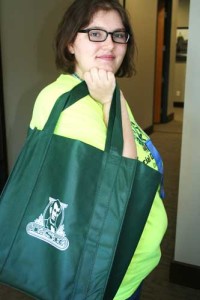Lincoln Savings Bank (LSB) hosted a class for Special Olympics Iowa athletes at its bank in Clive as part of the students’ Senior Plus Program at Valley High School. The class is for special needs students who have earned all their credits to graduate, but choose to stay in school longer to have access to lessons on living and vocational skills.
Derek Baker, LSB branch manager, spoke with the students about the importance of paying yourself first, the difference between checking and savings accounts, and establishing good credit.
Baker explained that when paying yourself first, you should put some of your paycheck or birthday money into a savings account before buying the things you may want. Putting away 10% of your paycheck is a good number to start. Doing this can help you learn to manage your money better, save toward a goal or have money for emergencies.
Some tips Baker shared to help save more included finding extra things to do to earn money, waiting before making larger purchases to decide if you really need it, watching spending on small purchases like coffee or candy and saving your change (it adds up!).
 The students also learned good credit begins with the understanding that when you borrow money, you are agreeing to pay it back, plus interest. Credit can be useful in emergencies and is more convenient than carrying cash, but you should avoid excessive debt as it can affect your ability to obtain housing or insurance.
The students also learned good credit begins with the understanding that when you borrow money, you are agreeing to pay it back, plus interest. Credit can be useful in emergencies and is more convenient than carrying cash, but you should avoid excessive debt as it can affect your ability to obtain housing or insurance.
“It tied in extremely well with our classwork,” said Cindy Grandquist, Valley special education teacher, “The next objective we are going to address in our daily living class is needs vs. wants. That was specifically addressed in their presentation.”
Baker asked the students to think about an item they really wanted to have – maybe a video game system or a new pair of jeans. When thinking about an item they wanted, he asked the students to ask themselves a few questions:
- Do I really need this item?
- If I don’t need it, why do I really want it?
- Am I sure that I’ll use it? Wear it?
- If I buy it now will I have enough money for other things I might need later?
- Will it go on sale soon?
- Can I find it somewhere else cheaper?
Grandquist expects to maintain the new partnership and is looking forward to future classes hearing this lesson from LSB. She was especially appreciative of the opportunity to have her students hear real-world advice from those who work in the field.
“It’s always good for kids to hear it from someone outside the classroom,” Grandquist added. “They tend to take it a little more seriously. The kids loved it. They talked about it all day.”
